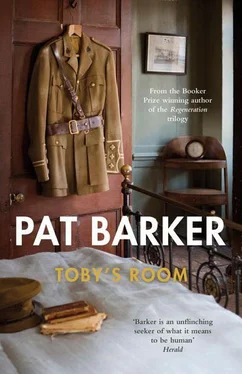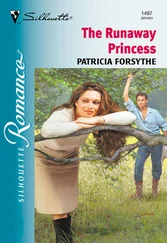‘Brothel-creeping,’ said Boiler, who did a fair bit of creeping of his own.
‘Nah,’ Wilkie said. ‘He’s in love with his horse.’
Evans called them to order. ‘Is anybody actually interested in playing this game?’
A door banged; a moment later Brooke came into the room, setting the candle flame guttering. You could smell rain on his skin, and his eyes were dilated from the dark …
Jerking awake, Neville realized his paper had slid on to the floor. Couldn’t be bothered to pick it up. His mind traced the fading outline of his dream. Of the five men playing cards at that table Evans and Wilkie were dead; Hen Man, he didn’t know; Boiler had been wounded, but survived. And he was here.
He drew a deep breath and looked around. Trotter was still absorbed in his game. All the cards were placed in a circle, except for the Kings, who were lined up, one by one, in the middle of the clock face. How harsh their faces were. Strange; all the card games he’d played — must be hundreds, in the last few years — and he’d never noticed that before. The aim, as far as Neville could tell, was to complete the outer circle before the last King joined his brothers. But if that was true, then Trotter must be doing something wrong, because in all the time Neville had watched him play the game, he’d never once completed the circle. Hours of effort, total concentration, and it counted for nothing: the four cruel Kings always won.
Elinor Brooke’s Diary
28 November 1917
Just back from a weekend in Garsington. All the way to Oxford on the train I was wondering whether the garden in winter would still be as beautiful as I remember it. The last time I was there was the second week in May. Toby was still alive.
Well, anyway, the answer to the question: Yes. As soon as I got there I went out and stood on the terrace looking down to the swimming pool. A sheet of silver water surrounded by strong dark shapes of box and yew. That’s why it’s still beautiful of course. It’s really a sculptor’s garden.
But. The garden’s still beautiful, but in this weather people don’t spend nearly as much time in it and what I noticed on this visit particularly was how much Garsington needs its lungs. Being cooped up inside on long dark evenings intensifies the atmosphere of gossip and intrigue. And I don’t think I’ve ever noticed before how red everything is. A very practical shade, of course, when the knives come out, as I think they often do .
I used to love it. Well, not Garsington, I used to love Ottoline’s parties in Bedford Square. For one thing it was the only place — is that an exaggeration? No, I don’t think it is — where Catherine was welcome. People could be incredibly hostile. And there was a time before the war when a couple of ‘Sladettes’, tastefully arranged on the lawn or by the fire, was an essential part of Bloomsbury decor. I’ve been one of that pair many a time, and I shouldn’t grumble because I learned a lot. But we all move on, I suppose. Now, when I think about being a ‘Sladette’, I’m reminded of Ottoline’s pug dogs trotting behind her wherever she goes .
Anyway, there I was, the ghost of my former self, wearing my brown taffeta evening dress (also a ghost of its former self), coming down to dinner far too early because I didn’t want to sit alone in my room. After mooching around the Red Room for a few minutes, I decided I might as well go for a walk. I went all the way down the garden but the wind was so cold I ended up taking refuge under the yew hedge that runs alongside the swimming pool. I was watching the reflections of clouds in the water, wondering how you’d paint them — how I’d paint them, rather; a lot of people wouldn’t have any problems — when round the corner of the hedge came a peacock, running towards me. I suppose he thought I was a rival, or a peahen perhaps — God knows I looked dowdy enough — because he immediately went into full display, his tiny, crested head darting from side to side, tail feathers quivering, with that curious, silvery, death-rattle hiss. It was terrifying. I backed away, he followed; I backed away again — and again — until I could feel yew twigs sticking into the back of my head. And then suddenly, just as I was about to scream or something, Ottoline appeared, skirts kilted up like a scullery maid, and shooed him away. Off he went, trailing all that feathered glory over the wet grass, and we stood and watched him go .
That’s what I like about Lady O. Underneath all the vapours, all the nonsense, there’s this very practical, shrewd, hard-working woman. How she puts up with the pacifists who’re supposed to be working the farm I just don’t know, for a lazier and more incompetent bunch it would be hard to find anywhere.
We walked slowly back to the house, Ottoline trying very hard to put me at my ease, and by the time we got there the gong had sounded for dinner. So in we trooped. Little red caps shading the candles — there you are, you see, red again — giving a livid tinge to the faces of the people round the table .
The talk was all of Ottoline’s recent trip to Edinburgh to see Siegfried Sassoon, who’s apparently decided to abandon his protest against the war and return to the front. He does seem to have treated her rather badly — he’d asked her to come, after all — but he refused to talk about his reasons for going back, and was generally off-hand — and of course she was hurt and can’t understand why he’s given in. Since then he’s written, so it’s been patched up a bit, but she still can’t understand why he’d want to go back and look after his men. I can actually and I said so. Everybody seemed surprised. I suppose I don’t normally say very much. It’s a hangover from being a Sladette: look pretty, keep your mouth shut. I said I admired people like Tonks, who hates the war as much as anybody but nevertheless spends hour after hour drawing ruined faces, because it’s the only thing he can do to help. And perhaps looking after a particular group of men is the only thing Sassoon can do.
After dinner we went into the Red Room for coffee. And then the pianola started up — playing very loud, dramatic Hungarian dances — the dressing-up chest was pulled into the hall, everybody donned various hats and scarves and wraps and feather boas and began leaping about in time with the music. And oh, my God, I sympathized with Sassoon, who’s spent months in a madhouse keeping his sanity (well, as far as anybody knows), and here I was after only one evening — crumbling.
In the end I just stood against the wall and watched. The music was absolutely deafening and yet all the time I could hear the death-rattle hiss of the peacock’s feathers as he paraded up and down in front of me.
My only real contact with Ottoline (apart from the great peacock rescue) came after tea next day. We sat by the fire and talked rather comfortably about this and that. She wanted to know what I’ve been up to since Toby was killed. I talked about going back home to paint the places we’d grown up in, and she told me about Katherine Mansfield, who, after her brother was killed, started to write stories about their childhood in New Zealand. Best things she’s ever done, apparently — according to Ottoline.
I suppose I should have been flattered by the implied comparison, but I wasn’t. In fact the whole conversation made me feel uneasy. Something about that use of her dead brother as a muse — because that’s what we’re talking about, really — seemed, I don’t know, not quite right. I’ve never liked the word ‘muse’ anyway, always makes me think of seedy old men groping young girls. But grief is a strange and savage thing. I’m thinking about the Ancient Britons — or the ancient somebody, I’m not sure — who used to eat their father’s liver because that’s where his courage was, and his sons had to make it part of themselves.
Читать дальше












